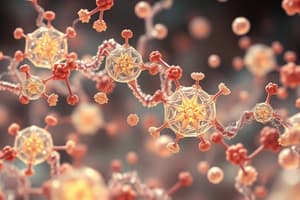Podcast
Questions and Answers
What is the primary function of carbohydrates in cells?
What is the primary function of carbohydrates in cells?
- To regulate gene expression
- To catalyze metabolic reactions
- To provide energy for cells (correct)
- To provide structure to the cell
What is the term for a carbohydrate composed of many monosaccharides?
What is the term for a carbohydrate composed of many monosaccharides?
- Disaccharide
- Lipid
- Monosaccharide
- Polysaccharide (correct)
Which of the following is a function of proteins in cells?
Which of the following is a function of proteins in cells?
- To provide energy for cells
- To store energy for cells
- To regulate cell shape
- To catalyze metabolic reactions as enzymes (correct)
What is the term for the overall 3D shape of a protein?
What is the term for the overall 3D shape of a protein?
What is a characteristic of lipids?
What is a characteristic of lipids?
What is the building block of proteins?
What is the building block of proteins?
What is the primary function of starch in plants?
What is the primary function of starch in plants?
Which lipid type is a major component of cell membranes?
Which lipid type is a major component of cell membranes?
What is the primary function of glycogen in animals?
What is the primary function of glycogen in animals?
What is the primary function of DNA?
What is the primary function of DNA?
What is the structure of DNA?
What is the structure of DNA?
What are the building blocks of nucleic acids?
What are the building blocks of nucleic acids?
Flashcards are hidden until you start studying
Study Notes
Carbohydrates
- Definition: Carbohydrates are biological molecules composed of carbon, hydrogen, and oxygen atoms, typically in a 1:2:1 ratio.
- Functions:
- Provide energy for cells
- Serve as structural components of cells
- Act as energy storage molecules
- Types:
- Monosaccharides: Simple sugars, e.g., glucose, fructose
- Disaccharides: Composed of two monosaccharides, e.g., sucrose (glucose + fructose)
- Polysaccharides: Composed of many monosaccharides, e.g., starch, cellulose
Proteins
- Definition: Proteins are biological molecules composed of amino acids, which are the building blocks of proteins.
- Functions:
- Catalyze metabolic reactions as enzymes
- Regulate gene expression
- Maintain cell shape and structure
- Transport molecules across cell membranes
- Respond to stimuli
- Structure:
- Primary structure: Sequence of amino acids
- Secondary structure: Local arrangements of amino acids, e.g., alpha helix, beta sheet
- Tertiary structure: Overall 3D shape of the protein
- Quaternary structure: Interaction between multiple polypeptide chains
Lipids
- Definition: Lipids are biological molecules that are insoluble in water and are composed of carbon and hydrogen atoms, with or without oxygen, nitrogen, and other elements.
- Functions:
- Energy storage
- Cell membrane structure
- Hormone regulation
- Vitamin absorption
- Types:
- Fats: Energy storage molecules, e.g., triglycerides
- Phospholipids: Major component of cell membranes, e.g., phosphatidylcholine
- Steroids: Hormone regulation, e.g., cholesterol
Polysaccharides
- Definition: Polysaccharides are carbohydrates composed of many monosaccharides linked together.
- Types:
- Starch: Energy storage molecule in plants
- Cellulose: Structural component of plant cell walls
- Glycogen: Energy storage molecule in animals
- Functions:
- Energy storage
- Structural components of cells
Nucleic Acids
- Definition: Nucleic acids are biological molecules that contain the genetic information of an organism.
- Types:
- DNA (Deoxyribonucleic acid): Genetic information storage
- RNA (Ribonucleic acid): Transcription and translation of genetic information
- Structure:
- Double helix: DNA double-stranded structure
- Nucleotides: Building blocks of nucleic acids, composed of a sugar, phosphate group, and nitrogenous base
Studying That Suits You
Use AI to generate personalized quizzes and flashcards to suit your learning preferences.




